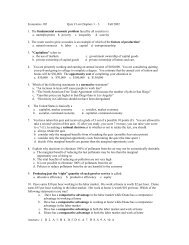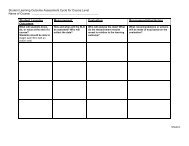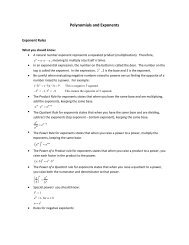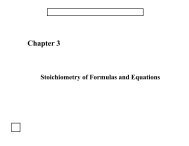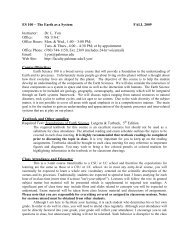World History I - Palomar College
World History I - Palomar College
World History I - Palomar College
You also want an ePaper? Increase the reach of your titles
YUMPU automatically turns print PDFs into web optimized ePapers that Google loves.
PALOMAR COLLEGE<strong>World</strong> <strong>History</strong> to 1650<strong>History</strong> 107Class No:Instructor: Prof. Robert BondOffice Hours: TBD.E-mail: rbond@ palomar.ed3.0 Unit CourseCourse SyllabusDESCRIPTION:<strong>History</strong> 100 is a survey of the major <strong>World</strong> Civilizations of Europe, Asia, Africa, and the Americas to1650. Emphasis will be placed on the development and interaction of environmental, political, social,religious, and economic systems.COURSE OBJECTIVES:Upon completion of the course, students will be able to:1. Be familiar not only with the major events and personalities of early world history, but have anappreciation of the different ways of life and thought that have developed in different areas of theworld.2. Students should also be able to examine and differentiate various characteristics {i.e. socialorganization, gender roles, effects of urbanization and the environment, etc.} of the worldcivilizations we cover.3. Catalog and interpret the role of religion, philosophy, and ideology in defining early worldcivilizations and societies.4. Identify the relationship between physical geography and climate on the development of earlyworld civilizations.5. Recognize political geography and changes in political geography.6. Evaluate and interpret the impact of cross-cultural contact and trade on the development of earlyworld societies and civilizations.7. Analyze works of literature in the context of early civilizations and societies.8. Develop an ability to analyze primary and secondary historical sources, reach conclusions based onthat analysis, and present their conclusions orally or in written form to the class/instructor.9. Cite sources appropriately in written work using the Chicago manual of Style (Turabian) or ModernLanguage Association format.10. Understand the major themes and important issues examined by world historians. We willconcentrate on the major approaches of world history: comparison, connections, and change.1
PALOMAR COLLEGECLASS FORMAT:Class time will be organized into lectures and class discussion. Class discussion will be based on primarysources available on Blackboard. It is expected that students come to class having read the assignedmaterial and are ready to actively participate in class discussion. Time will also be set aside for exams.Please feel free to ask questions about the material at any time.Please turn off/silence cell phones before class begins. Texting in not acceptable during class.METHODS OF EVALUATIONQUIZZES:There will be two quizzes given during the Fall Session. Quiz dates can be found in the schedule below.Each quiz will test your geographical knowledge of the world. All quizzes will be found on Blackboardas noted in the schedule below. The geography quizzes will be done in-class. Each quiz is worth 50points. The total value for all quizzes is 100 points.PARTICIPATION/PRIMARY SOURCES:We will be discussing in class primary sources related to the civilizations under study. Up to 100 pointswill be awarded for class participation and/or submission of assignments on Blackboard based on ourdiscussions during the Fall session.EXAMS:There will be four exams during the Fall. None of the exams will be cumulative. Each exam will beworth 100 points for a total of 400 points. The format of the exams will be stated on the exam studyguides. As an aid, a study guide will be available on Blackboard out one week before the exam. Makeupexams will be given only for excused absences (see Attendance below) or extraordinary andverifiable emergencies.GRADES:Assessment Points Grade ScaleQuizzes 100 A 600 540Exams 400 B 539 480Primary Sources 100 C 479 420D 419 360Total 600 F 359 02
PALOMAR COLLEGETEXT:Jerry H. Bentley & Herbert F. Ziegler, Traditions & Encounters. Volume I, 4 th edition or 3 rd edition.McGraw-Hill Publisher. Available at the campus bookstore or as an eBook at:http://mhhe.com/dbm/rdr.pl?p=1004668034&a=4&c=56593&s=1Textbook website:4 th edition: http://highered.mcgraw-hill.com/sites/0073406937/information_center_view0/BLACKBOARD:Many of the components of this class will be available on Blackboard. Primary Sources, Quizzes andEssay Assignments will be available only online. Logon site:http://www.palomar.edu/blackboard/Use of Blackboard for the class is mandatory. Be sure to access and be familiar with Blackboard by theend of the first week of class.ATTENDANCE:Attendance will affect the quality of your overall performance in the course. It is important that youattend class, as material for the exams will come from lecture material and on topics discussed in classin addition to our assigned texts. Unexcused absences will affect your grade. Attendance will be takenduring each class session. Attendance will be used as a consideration for borderline grades.If you have an excused absence, be sure to inform the instructor prior to that absence. Excusedabsences include, jury duty (w/documentation), call to active military duty, and religious holidays.Please note the following dates for Add/Drop: Last Day to Add course is; Drop Without a ‘W’ Deadlineis; Last Day to Drop course is. See Class Schedule for additional information.It is the student’s responsibility to confirm with the instructor or process his or her own adds and/ordrops by the dates noted above.TARDINESS:Promptness reflects professional courtesy and is expected. Repeated tardiness is not acceptable andwill affect your final grade. In addition, regular, early departure from class will not be tolerated.3
PALOMAR COLLEGEACCOMMODATION OF DISABILITY:Students with disabilities who may need academic accommodation should make arrangements withthe instructor during the first week of class. Students disabled during the session should consult withthe professor as soon as possible. Students with disabilities must complete all course assignments topass the course. See Class Schedule for additional information.ACADEMIC INTEGRITY & STUDENT CONDUCTCheating, plagiarism, and other forms of academic dishonesty will not be tolerated. Violation of thispolicy will result in no points being awarded to the student for that assignment. See Student code ofconduct at: http://www.palomar.edu/Code_of_Conduct_condensed_version.pdf for additionalinformation.NOTES:4
PALOMAR COLLEGECOURSE SCHEDULEDue dates are noted for all assignments. Availability of assignments will be announced on Blackboard.The format, readings, and assignments for class are open to change at my discretion. I will announceany changes to you in class and on Blackboard.Week Date Topic Assignments1Introduction, Study of <strong>World</strong> Civilizations,Primary Sources, Prehistory & The FirstCivilizations in the Middle East & AfricaThe First Civilizations in the Middle Eastand Africa continued…Bentley & Ziegler, chapters 1,2 &3Quiz I Study Guide & Maps available onBlackboard.[Print out Primary Source Pack and Bring in bySeptember 1st for 15 points of extra-credit.}The First Civilizations in the Middle Eastand Africa continued…2Ancient Chinese & Indian CivilizationQuiz I, Bring a scanton from 882-E to class.Quiz II Study Guide Available on BlackboardBentley & Ziegler, chapters 4 & 5Deadline for Primary Source Packs for extracredit.Read Primary Source 1: Mandate of Heaven fornext class.3Ancient Chinese & Indian Civilizationcontinued…Holiday-No Class!Exam I Review4Exam IBring a scantron form 886-E to class.Introduction to the Classical PeriodEurasian EmpiresBentley & Ziegler, chapters 7,8, & 9Eurasian Empires continued...5Eurasian Cultural TraditionsBentley & Ziegler, chapters 10 & 11Read Primary Source 2: Lessons for Women fornext class.Exam II Study Guide Now Available5
PALOMAR COLLEGEWeek Date Topic Assignments6Eurasian Cultural Traditions continued….Eurasian Cultural Traditions continued….7Eurasian Social Hierarchies Bentley & Ziegler, chapter 12 (pages 301-311)Eurasian Social Hierarchies continued….8Africa & the AmericasAfrica & the Americas, continued…Bentley & Ziegler, chapter 6 & review chapter 3(pages 80-83)Exam II ReviewExam II (Bring a scantron form 886-E to class)9Commerce & CultureBentley & Ziegler, chapter 12 (p.288-300);chapter 16 (p.411-416 & 423-429); and chapter19 (p.487-500)10Commerce & Culture continued…Commerce & Culture continued…Quiz II in Class (Bring a scantron form 882-E toclass)Read Primary Source 3: Ibn Battuta for nextclass.Exam III Study Guide Now Available11Postclassical China Bentley & Ziegler, chapter 15Postclassical China continued…Byzantium & European Christendom Bentley & Ziegler, chapters 13, 17, & 2012Byzantium & European Christendomcontinued…13Exam III (Bring a scantron form 886-E to class)The <strong>World</strong> of Islam Bentley & Ziegler, chapter 1414The <strong>World</strong> of Islam continued…The <strong>World</strong> of Islam continued…Exam IV Study Guide Now Available6
PALOMAR COLLEGEWeek Date Topic Assignments15The MongolsThe Mongols continued…Bentley & Ziegler, chapter 18Read Primary Source 4: William of Rubruck'sAccount of the Mongols for next class.16The Fifteenth Century Bentley & Ziegler, chapters 21 & 22The Fifteenth Century continued…Exam IV ReviewFExam IV(Bring a scantron from 886-E)7


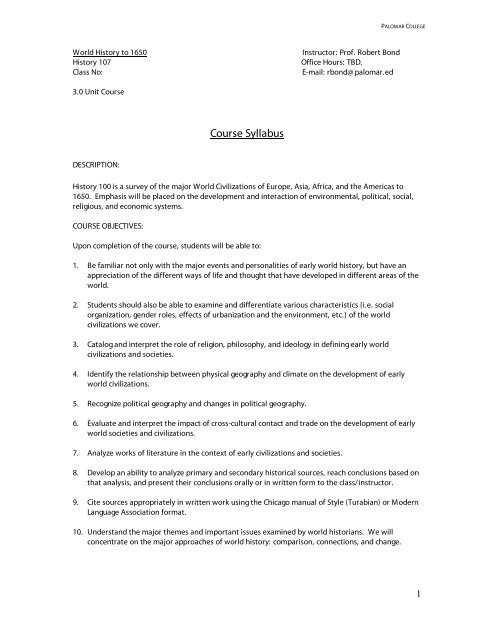
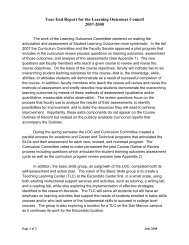
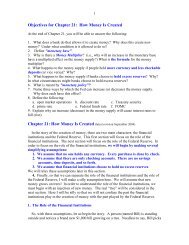
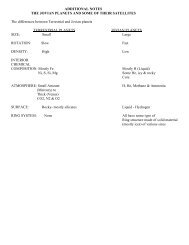
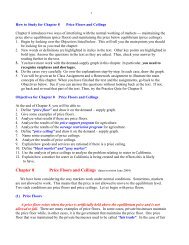
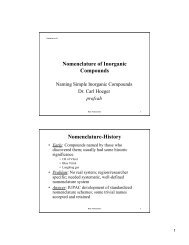
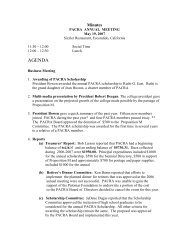
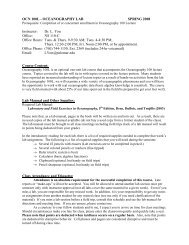
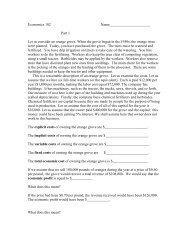
![Ch. 3 [pdf]](https://img.yumpu.com/49528659/1/190x245/ch-3-pdf.jpg?quality=85)
